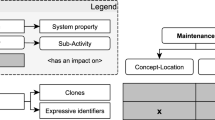Abstract
In domains such as aerospace, automotive, and medical devices, high-quality software is key due to the critical nature of these applications and the low margin for failure. Ensuring the quality of software is essential to prevent potentially catastrophic outcomes. In this paper, we present an approach to derive quality assurance plans from well-defined process models. Utilizing the GQM model, we derive quality requirements and metrics based on a process example, which we realize in the process management tool Stages. Based on the exemplary realization, we simulate 100 projects to provide data used in a recommendation system that enriches the process model such that quality assurance plans including the metrics of interest can be generated from the process model. Our findings show that, given sufficient data is available, context-specific quality assurance plans can be generated and which particular steps have to be taken to realize the overall concept in the studied tool.
Access this chapter
Tax calculation will be finalised at checkout
Purchases are for personal use only
Similar content being viewed by others
Notes
- 1.
Note that, due to the exploratory nature of this research, we intentionally selected a fairly simple process to get data of manageable volume, i.e., a proof-of-concept. A discussion of implementing cases of relevant size and complexity in industry settings is discussed in the future work in Sect. 5.
- 2.
To allow for easy inspection and validation, the proof-of-concept only considers the highest-rated metric. The final solution concept, however, shall provide a ranked list of metrics, so that the users can make a decision which metric to use.
- 3.
Note that due to confidentiality of actual customers’ project performance data, we used synthetic data in a simulation-based approach. In the actually deployed tool, the required data can be made available, even though an explicit evaluation of the appropriateness of the used measurement per activity is subject to a tool update.
References
ECSS-M-ST-80C Space Project Management: Risk Management (2008). https://ecss.nl/standard/ecss-m-st-80c-risk-management/
ECSS-E-ST-40C: Space Engineering - Software (2009). https://ecss.nl/standard/ecss-e-st-40c-software-general-requirements/
IEEE Standard for Software Quality Assurance Processes. IEEE Std 730-2014 (2014). https://doi.org/10.1109/IEEESTD.2014.6835311
Al Mohamad Saleh, A., Alzahrani, S.: Development of a maturity model for software quality assurance practices. Systems 11(9), 464 (2023). https://doi.org/10.3390/systems11090464
Andrianova, A., Itsykson, V.: Generating unit tests using static analysis and contracts. In: 2013 Tools and Methods of Program Analysis. IEEE, October 2013. https://doi.org/10.1109/tmpa.2013.7163725
Ariza, P., Pineres, M., Santiago, L., Mercado, N., De la Hoz, A.: Implementation of MOPROSOFT level I and II in software development companies in the Colombian Caribbean, a commitment to the software product quality region. In: 2014 IEEE Central America and Panama Convention. CONCAPAN. IEEE, November 2014. https://doi.org/10.1109/concapan.2014.7000402
Axelrod, A.: Acceptance test driven development. In: Complete Guide to Test Automation, pp. 371–394. Apress, Berkeley (2018). https://doi.org/10.1007/978-1-4842-3832-5_16
Basili, V.R., Caldiera, G., Rombach, D.H.: The Goal Question Metric Approach, vol. I. Wiley, Hoboken (1994)
Beck, K.: Test Driven Development, By Example. Addison-Wesley Longman, Amsterdam (2002)
Brondani, C.H., Bertuol, G., Fontoura, L.M.: Artifact quality assessment plans generation from tailored processes. In: Proceedings of the 31st International Conference on Software Engineering and Knowledge Engineering. SEKE2019, KSI Research Inc. and Knowledge Systems Institute Graduate School, July 2019. https://doi.org/10.18293/seke2019-032
CMMI Product Team: CMMI for Development, Version 1.3. Technical report. CMU/SEI-2010-TR-033, Software Engineering Institute, Carnegie Mellon University (2010)
Dautovic, A., Plosch, R., Saft, M.: Automatic checking of quality best practices in software development documents. In: 2011 11th International Conference on Quality Software. IEEE, July 2011. https://doi.org/10.1109/qsic.2011.23
ESA-ESTEC Requirements and Standards Division: ECSS-Q-HB-80-04A: Space product assurance, software metrication programme definition and implementation. Technical report, ESA (2011)
Honglei, T., Wei, S., Yanan, Z.: The research on software metrics and software complexity metrics. In: 2009 International Forum on Computer Science-Technology and Applications. IEEE (2009). https://doi.org/10.1109/ifcsta.2009.39
International Organization for Standardization: ISO/IEC 25000:2005, Software Engineering - Software Product Quality Requirements and Evaluation (SQuaRE). Technical report, ISO (2005)
International Organization for Standardization: ISO/IEC 25023:2016: Systems and software engineering - Systems and software Quality Requirements and Evaluation (SQuaRE) - Measurement of system and software product quality. Technical report, ISO (2016)
International Organization for Standardization: ISO/IEC TS 33061: Information technology - Process assessment - Process capability assessment model for software testing. Technical report, ISO (2020). https://www.iso.org/standard/74988.html
ISO: ISO 26262-10:2018 - Road vehicles - Functional safety - Part 10: Part 10: Guidelines on ISO 26262 (2018). https://www.iso.org/standard/68392.html
Laporte, C.Y.: Software Quality Assurance. Wiley-IEEE Computer Society Inc, Hoboken (2018)
Mayr-Dorn, C., Ratiu, C.C., Marchezan de Paula, L., Keplinger, F., Egyed, A., Walden, G.: Actionable light-weight process guidance. J. Syst. Softw. 214, 112064 (2024). https://doi.org/10.1016/j.jss.2024.112064
Melli, R.: Automated software project planning and control. IFAC Proc. Vol. 21(14), 1–7 (1988). https://doi.org/10.1016/s1474-6670(17)53672-1
Rajapaksha, D., Tantithamthavorn, C., Jiarpakdee, J., Bergmeir, C., Grundy, J., Buntine, W.: SQAPlanner: generating data-informed software quality improvement plans. IEEE Trans. Software Eng. 48(8), 2814–2835 (2022). https://doi.org/10.1109/tse.2021.3070559
van Solingen, R., Berghout, E.: The Goal/Question/Metric Method: A Practical Guide For Quality Improvement Of Software Development. No. ISBN-13: 978-0077095536, McGraw-Hill Inc. (1999)
Vogel, M., et al.: Metrics in automotive software development: a systematic literature review. J. Softw. Evol. Process. 33(2) (2021). https://doi.org/10.1002/SMR.2296
Wohlin, C., Runeson, P., Höst, M., Ohlsson, M.C., Regnell, B., Wesslén, A.: Experimentation in Software Engineering. Springer, Heidelberg (2012). https://doi.org/10.1007/978-3-642-29044-2
Acknowledgment
As part of the project ANuKI, this work is partly funded the German Aerospace Center under Grant No.: 50RM2100A.
Author information
Authors and Affiliations
Corresponding author
Editor information
Editors and Affiliations
Rights and permissions
Copyright information
© 2025 The Author(s), under exclusive license to Springer Nature Switzerland AG
About this paper
Cite this paper
Guzman, J.C., Dörr, H., Gruber, C., Münch, J., Kuhrmann, M. (2025). On the Derivation of Quality Assurance Plans from Process Model Descriptions. In: Pfahl, D., Gonzalez Huerta, J., Klünder, J., Anwar, H. (eds) Product-Focused Software Process Improvement. Industry-, Workshop-, and Doctoral Symposium Papers. PROFES 2024. Lecture Notes in Computer Science, vol 15453. Springer, Cham. https://doi.org/10.1007/978-3-031-78392-0_8
Download citation
DOI: https://doi.org/10.1007/978-3-031-78392-0_8
Published:
Publisher Name: Springer, Cham
Print ISBN: 978-3-031-78391-3
Online ISBN: 978-3-031-78392-0
eBook Packages: Computer ScienceComputer Science (R0)




